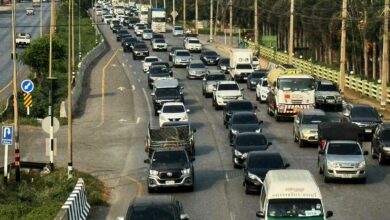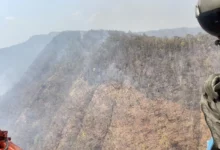Phuket Gazette Thailand News: DNA tests proposed for migrant workers; Rubber farmers fight on; Mahouts fear losing elephants

PHUKET MEDIA WATCH
– Thailand news compiled by Gazette editors for Phuket’s international communityProposal to DNA-test migrant workers panned
The Nation/Phuket Gazette
PHUKET: Prompted by concerns over the ease with which foreigners will be able to travel in and out of Thailand once the Asean Economic Community (AEC) commences in 2015, the Institute for Forensic Medicine (IFM) is calling on the government to collect the DNA of all migrant workers entering the country, to be stored in a national database for future identification.The proposal has been met with criticism from all sides, ranging from employers, who cite the high cost, to human rights advocates, who say the idea is a blatant violation of basic human rights and would generate xenophobia.
IFM commander Pol Maj Gen Pornchai Suteerakune cited a scenario he dubbed “foreign murderers lurking in the country” as the reason for collecting DNA samples. “We have to be wary of the increasing number of foreigners travelling to Thailand. Without a well thought-out plan in place, problems will arise.
“Migrant workers will be able to commit crimes in Thailand, then escape the Thai justice system by fleeing to their own countries where Thai law is not applicable,” he explained.
The IFM’s proposal suggests that employers – initially those running factories – be required to pay up to 5,000 baht for each DNA sample collected from a migrant worker, and that the cost be deducted from the worker’s salary in small monthly increments.
“We need to work on a solution as a defensive measure in preparation [for the AEC],” Maj Gen Pornchai added.
Another plan in the pipeline is to set up a provincial IFM office in Southern Thailand’s Provincial Police Region 9, where DNA samples could be taken from crime scenes to assist counterinsurgency operations. Under the plan, the IFM would eventually establish regional offices in all 10 provincial police regions, enabling the IFM to easily assist police investigations across the country.
Department of Employment director-general Pravit Khiengpol said “no country in the world does such a thing [to migrant workers].”
He added that it would lead to a backlash from international human rights advocates, as migrant workers, who already have to pay for their medical examinations and health insurance to ensure they can secure employment, would be seen as being doubly exploited by Thai authorities.
The DNA proposal also goes against the policy of the department, which aims to further reduce the costs shouldered by migrant workers, while encouraging employers to register illegal workers and legitimise their employment.
“The higher cost [of DNA collection] would drive migrant workers underground and force many of them to continue working illegally. The department already collects biodata of these workers – their fingerprints – in addition to their photos and other details. The police can always request access to this additional information from us,” Pravit added.
Human Rights Commissioner Dr Niran Pitakwatchara said taking non-consensual DNA samples was a violation of one’s basic human rights, and doing so was regarded as discriminatory and portrayed migrant workers who have not committed crimes in a negative light.
“Their human rights should be respected even further [by Thai authorities] when the AEC 2015 takes affect. The protocol should not focus only on the economic gains generated by migrant workers, while at the same time treating them as inferior,” he added.
Wiriya Sirichai-ekkawat, head of the Thai Overseas Fisheries Association, said the idea had some merit but was too costly and impractical, because collecting someone’s DNA could not be forced on anyone against their will. He said mandatory DNA collection would encourage fishing trawler skippers or employers to hire workers secretly at much lower fees, while organisations like the International Labour Organisation (ILO) would certainly oppose it, he said.
The head of a network of advocacy groups for migrant workers said identity records and registration details of migrant workers could be retrieved easily through the Department of Employment and the immigration police database.
The majority of crimes committed by migrant workers were related to illegal entry and overstaying their residency permits.
Rubber farmers vow to fight on
The Nation/Phuket Gazette
PHUKET: Rubber farmers from Prachuap Khiri Khan set up roadblocks on a key section of Phetkasem Road yesterday in Bang Saphan district and vowed to continue their protest against the government, after it failed to heed their calls for subsidies in order to hike rubber prices. Heavy congestion caused by the roadblock was eventually eased after the farmers reached an agreement with police and allowed several lanes to be re-opened.
It is a second attempt made by around 400 farmers to make their demands heard, after the first roadblock last month was dismantled during violent clashes with police.
Motorists travelling south have been advised to take an alternative route along the coast to avoid long tailbacks on Phetkasem Road. The protest site is located at Si Nakhon intersection not far from Thammarat intersection, which saw scores of protestors and anti-riot police injured during the farmers’ first protest in September. Several police vehicles were also set on fire during the protest.
Police said that yesterday they had arrested three men who were acting as security for the protesting farmers. Officers found a number of home-made bombs and weapons, including slingshots, in their possession.
A network of rubber and palm-oil farmers from the 16 southern provinces declared their support for the roadblock yesterday and threatened to escalate the protest if no one from the government met to discuss their demands. In response, Deputy Prime Minister Pracha Promnok arrived in the province at 4pm yesterday, however, the outcome of the talks is still unknown.
In addition to barricades, a number of trees were felled to block Phet Kasem Road – the main route to the south. Protestors then delivered a series of blistering attacks on the government, criticising it for not delivering a price guarantee that would benefit rubber tappers, and instead granting per-rai subsidies to wealthy plantation owners.
Speeches also attacked the Yingluck administration’s amnesty bill, suggesting that the renewed protests could be politically motivated.
Meanwhile, provincial authorities have submitted a petition to the provincial court asking for an injunction to immediately order protesters to vacate the site. The court is expected to issue its ruling today. Authorities in neighbouring Chumphon province have also called an urgent meeting to discuss measures to halt possible rallies supporting the Prachuap Khiri Khan roadblock.
Mahouts fear losing their elephants
The Nation/Phuket Gazette
PHUKET: It would be hard for a 45-year-old mahout from Sur — Phuket Gazette Editors
Join the conversation and have your say on Thailand news published on The Thaiger.
Thaiger Talk is our new Thaiger Community where you can join the discussion on everything happening in Thailand right now.
Please note that articles are not posted to the forum instantly and can take up to 20 min before being visible. Click for more information and the Thaiger Talk Guidelines.
Leave a Reply
You must be logged in to post a comment.







